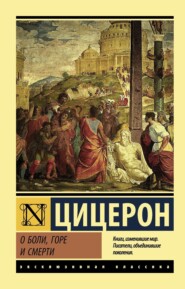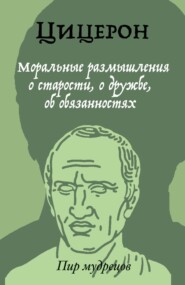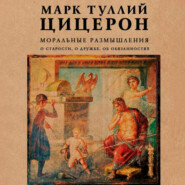По всем вопросам обращайтесь на: info@litportal.ru
(©) 2003-2024.
✖
Cicero's Tusculan Disputations
Автор
Год написания книги
2018
Настройки чтения
Размер шрифта
Высота строк
Поля
123XXX. But we will speak of this another time: at present it is sufficient not to attribute our misery to the loss of our friends, nor to love them more than, if they themselves could be sensible of our conduct, they would approve of, or at least not more than we do ourselves. Now as to what they say, that some are not at all appeased by our consolations; and, moreover, as to what they add, that the comforters themselves acknowledge they are miserable when fortune varies the attack and falls on them—in both these cases the solution is easy: for the fault here is not in nature, but in our own folly; and much may be said against folly. But men who do not admit of consolation seem to bespeak misery for themselves; and they who cannot bear their misfortunes with that temper which they recommend to others are not more faulty in this particular than most other persons; for we see that covetous men find fault with others who are covetous, as do the vainglorious with those who appear too wholly devoted to the pursuit of glory. For it is the peculiar characteristic of folly to perceive the vices of others, but to forget its own. But since we find that grief is removed by length of time, we have the greatest proof that the strength of it depends not merely on time, but on the daily consideration of it. For if the cause continues the same, and the man be the same, how can there be any alteration in the grief, if there is no change in what occasioned the grief, nor in him who grieves? Therefore it is from daily reflecting that there is no real evil in the circumstance for which you grieve, and not from the length of time, that you procure a remedy for your grief.
XXXI. Here some people talk of moderate grief; but if such be natural, what occasion is there for consolation? for nature herself will determine, the measure of it: but if it depends on and is caused by opinion, the whole opinion should be destroyed. I think that it has been sufficiently said, that grief arises from an opinion of some present evil, which includes this belief, that it is incumbent on us to grieve. To this definition Zeno has added, very justly, that the opinion of this present evil should be recent. Now this word recent they explain thus: those are not the only recent things which happened a little while ago; but as 124long as there shall be any force, or vigor, or freshness in that imagined evil, so long it is entitled to the name of recent. Take the case of Artemisia, the wife of Mausolus, King of Caria, who made that noble sepulchre at Halicarnassus; while she lived, she lived in grief, and died of it, being worn out by it, for that opinion was always recent with her: but you cannot call that recent which has already begun to decay through time. Now the duty of a comforter is, to remove grief entirely, to quiet it, or draw it off as much as you can, or else to keep it under, and prevent its spreading any further, and to divert one’s attention to other matters. There are some who think, with Cleanthes, that the only duty of a comforter is to prove that what one is lamenting is by no means an evil. Others, as the Peripatetics, prefer urging that the evil is not great. Others, with Epicurus, seek to divert your attention from the evil to good: some think it sufficient to show that nothing has happened but what you had reason to expect; and this is the practice of the Cyrenaics. But Chrysippus thinks that the main thing in comforting is, to remove the opinion from the person who is grieving, that to grieve is his bounden duty. There are others who bring together all these various kinds of consolations, for people are differently affected; as I have done myself in my book on Consolation; for as my own mind was much disordered, I have attempted in that book to discover every method of cure. But the proper season is as much to be attended to in the cure of the mind as of the body; as Prometheus in Æschylus, on its being said to him,














